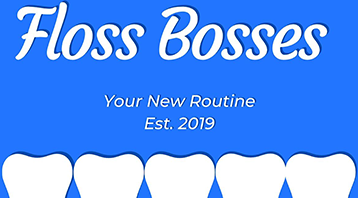Before I start my series Systemic Health & Gums, it is important to address what is gum disease.
February is National Gum Disease Awareness Month. At Floss Bosses, our dental hygienists love to fight gum disease with….teeth cleaning.
Gum disease is a general term referring to different changes affecting gums and the surrounding tissue of the tooth. Depending on the signs and symptoms, it can be categorized into gingivitis and periodontitis.
Gingivitis = gingiva (gums) + -itits (inflammation) = inflammation of the gums. Like any other inflammation, it is bleeding, puffiness, redness, and swelling. It is our immune system’s reaction to invaders like bacteria or injury. Sometimes, a person won’t even realize how bad it is until it hurst. When it hurts, it might be affecting the teeth. Yes. Gum disease can affect the health of your teeth.
However, in many cases gingivitis does not hurt. All one might experience is bleeding gums. If the gums have always bled, many believe it is an expected state not realizing, it is a state of disease affecting their mouth and the whole body. I frequently hear “don’t worry my gums always bleed.” If unhealthy gums are kept unattended, biofilm not removed, our own immune system can cause damage to its tissue and body. Gum disease is an end result of our immune system overreacting to the stimulus like biofilm and germs associated with it.
This is one of the ways periodontitis can develop. In periodontitis, we see physical changes occurring around the tooth. Periodontitis= Peri (around) + Donta (tooth)+ -itits (inflammation)
Some of the changes seen are:
- the bone that holds the teeth in place gets perma damage (bone that is gone is gone forever)
- gums start to recede (you know that saying long in the tooth? Yep. That’s that)
- furcations begin (when bone shrinks so much so that an instrument can get thru and in between 2 roots)
- bad taste and bad breath starts (because of the microbial bi-products (🦠💩🦠) and all the changes that they cause); in this case, it’s important to note that the actual person with gum disease doesn’t even know that they have halitosis (bad breath. The germs also affect the sense of smell as well…yep… if you know someone that has halitosis and you’ve ever wondered why they do not do anything about it, it’s probably because they just don’t know.
These physical changes can be damaging enough that teeth start to move and become lose.
Periodontitis is complicated. There are so many factors affecting it. It is not as simple as not brushing or flossing. Sometimes, our immune system overreact. Sometime malocclusion (how our teeth bite together) can put extra pressure on one tooth causing bone loss. The bone “thinks” this is too much for me… I’m out of here. Another couple examples are of course biofilm, calculus (the hard stuff on the tooth) and rough fillings, crowns and bridges.
Our systemic health also plays a huge role in our gum health and vice versa.
Periodontitis and gingivitis do not have to affect the whole mouth and all the teeth. It may be a single tooth, a few teeth or the full mouth.
Why is this bad, besides the obvious tooth loss? Mouth is a portal to the body. It just might be the root of all evil. Unfortunately for us, the microbes and their bi-products affect the rest of our health.
Gum disease is a low grade infection. It will not cause us obvious symptoms. We don’t even feel it a lot of times. We defiantly do not drop dead from it. However, over the course of a lifetime (long in the tooth usually is noticed in older people), it slowly poisons us. It affects our lungs, kidneys, heart. It’s been linked to diabetes and now Alzheimer’s among other conditions. Individuals with gum disease are more at risk of stroke.
What’s the best way to treat it?
Always make sure you get your gums checked on regular basis by your dental hygienist. How often your gums should be checked is dependant on your oral health and systemic health. A full periodontal exam is recommended at least once a year. Someone with risk factors like diabetes, dental hygiene exam is recommended every 3-6 months. It is never okay to have measurements of periodontal pockets that are 4mm or more in depth. It is never okay to have recessions and furcations. Never ignore bleeding gums.
Prevention is the key! Dental hygiene treatments like teeth cleaning is recommended at least every 6 months for a healthy person. For someone with risk factors like crowns, bridges, implants, braces, invisaglin, or systemic health issues like diabetes or lung disease, the treatment is recommended every 3-4 months.
For active cases, initial treatment which includes teeth cleaning may take a couple of visits depending on the severity of the disease. At Floss Bosses, we utilize hand scaling, root planing and ultrasonic cleaning as well as laser assisted periodontal therapy. Each teeth cleaning is initiated with Laser Bacteria Reduction to minimize the release of the bad germs into the system.
The teeth cleaning visits and home care like flossing, brushing and rinsing with anti-microbial rinse are as important as initial treatment. If one misses their 3 months teeth cleaning therapy, sometimes it is like starting the treatment from scratch.
Teeth cleaning needs to always be modified to individual needs. Teeth cleaning at Floss Bosses is always customized. It is almost never the same as your neighbours.
Please, when you notice bleeding gums, go see your dental practitioner to have it checked and treated.
To all my non-dentals, go floss, brush, get your teeth cleaned & smile for your better health!

